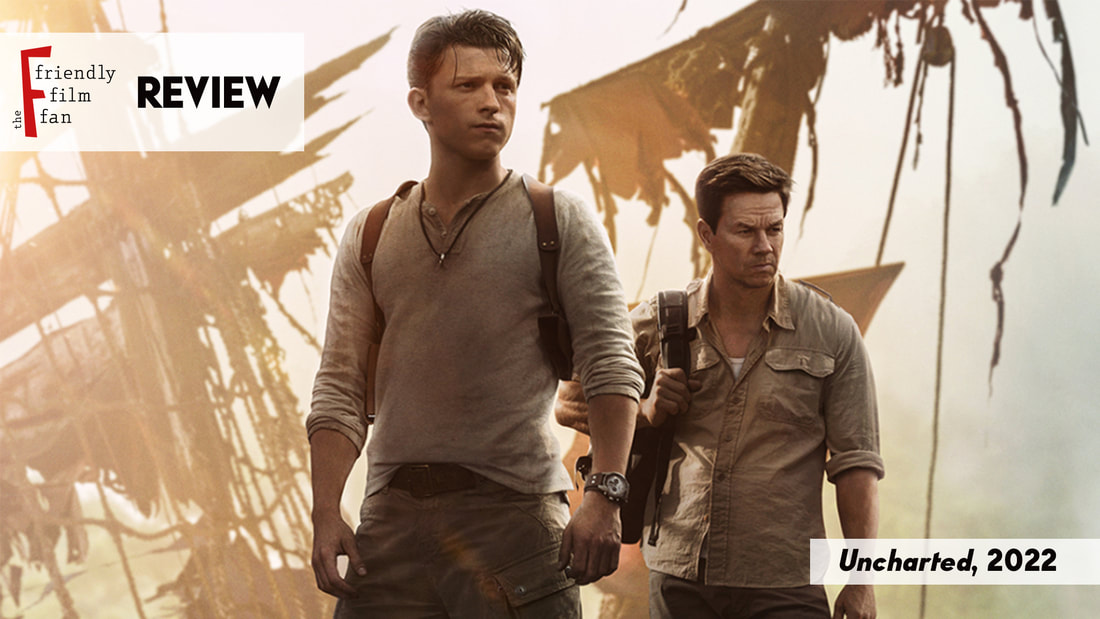|
Uncharted, a new movie adaptation of a beloved action-adventure video game franchise, has been languishing in development hell for well over a decade, to the point where Mark Wahlberg (who plays Sully in the film) was, at one point, attached to play franchise lead Nathan Drake before being relegated to the main supporting cast. Several directors had hopped on to the project and then hopped off to do other things, several re-writes were done, and the actual shooting of the film finished in October of 2020. Now, in 2022, that adaptation has finally arrived, and with it some expectation that things probably wouldn’t be too praise-worthy in the final product. I mean, who knew that just over a year after filming finished, the movie’s resident Nathan Drake (Tom Holland) would be the headline character in the third-highest domestic box office grosser of all time, and thus ably proven to be able to carry a movie on his own? It would seem that turn even surprised Sony Pictures, who produced the Holland-starring Spider-Man films. Thus, the superstar ends up sharing most of his screen-time with Mark Wahlberg’s character not out of necessity, but out of, perhaps, a sense that he would need a more established, well-known anchor to help carry the scenes where he may otherwise have had to do a lot of heavy lifting (it’s happened in all three MCU Spider-Man films too).
What we’re left with in the Uncharted movie is a harmless but bland series of action set-pieces and lackluster puzzle solving, much of which set against some of the worst green-screen backdrop compositing I’ve seen in a movie in quite some time, sprinkled through a thoroughly underwhelming story that really only makes cursory nods to its source material without engaging in what almost any of it actually means or what made that source material so beloved in the first place. Essentially, it’s a cover band opening act (at a show with two opening acts) that plays the hits you know, but not nearly as good as the original artist, and the hits they’re playing aren’t really the ones you wanted to hear anyway. They’re just there for the moment while you wait for the headliner to finish setting up. Holland’s Nathan Drake feels like a diet version of games’ protagonist, meanwhile Wahlberg’s Sully can’t be bothered to feel even a little bit like the original classic side character, and the only person who walks away from the whole thing without an actively negative note on their resume is Antoni Banderas as the film’s lackluster villain. For those hankering for another adventure movie to see in theaters, that may do well enough to pass the time, but fans of the games will more than likely be either disappointed by the film’s lackluster story or resolved to feel as apathetic toward it as they already expected to be. Video game movies have almost always fallen short of their source material, the best video game movies usually being those not adapted from gaming by informed by it, like how Scott Pilgrim vs. the World uses a lot of video game tropes to tell a fun, wild story where its most unbelievable elements are somehow plausible in the world it creates. Direct adaptations have significantly less success. Tomb Raider, Mortal Kombat, Resident Evil – these are all direct adaptations of other beloved video game franchises that don’t really work as well as they should, no matter what cool set pieces are thrown in or – in the case of the second one – no matter how bloody and violent their ratings allow them to be in order to maintain faithfulness. All this begs the question: are video games even adaptable for the silver screen? There have been some minor successes here and there with adapting games to television; most recently Arcane, which is based on the League of Legends game, has had great success in its translation to a Netflix animated series. But movies are a whole different beast than television, and we still don’t really know whether or not the upcoming Halo adaptation for Paramount+ will yield any promising results. The tricky thing in adapting video games is always: what story is the adaptation going to tell? You can’t just re-tell the games’ stories beat for beat in live-action, no matter how acclaimed they are, because nothing will feel fresh or new to the viewer. Then again, attempting to set a story outside of the main narrative – as Uncharted does in being a prequel to the main series of games – yields significant risk of alienating the customer base most prepared to appreciate what a good adaptation can do by just not being as good as the games themselves. Unfortunately, this movie falls to the latter of those. Uncharted isn’t especially offensive to fans of its source material, and some of it – such as the final set piece – does work to a degree, but those degrees are just barely passable in an era where streaming and television is not only best equipped to handle telling stories like it, but unbound by the constraints of a big-budget theatrical release in terms of time and pacing. Playing through these stories has always been more exciting than watching them, and unfortunately, the gap between the two storytelling mediums remains as wide as ever. Perhaps one day someone will get a big screen video game adaptation right. But it won’t be today. I’m giving “Uncharted” a 4.6/10 - The Friendly Film Fan
0 Comments
Leave a Reply. |
AuthorFilm critic in my free time. Film enthusiast in my down time. Categories
All
|

